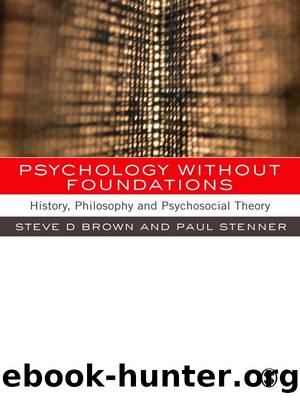Psychology without Foundations by Brown Steven; Stenner Paul; & Paul Stenner

Author:Brown, Steven; Stenner, Paul; & Paul Stenner
Language: eng
Format: epub
ISBN: 783513
Publisher: SAGE Publications
Published: 2009-08-30T16:00:00+00:00
The human mind has no knowledge of the human body, nor does it know it to exist, save through ideas of modifications by which the body is affected. (E. II. prop. 19)
This crucial proposition couples movements in ideas to modifications in the body (by way of âideas of modificationsâ), or, to put it more plainly, knowing (as a mode of thought) proceeds in parallel fashion to the bodyâs physical engagements in unfolding scenes of encounters. As we will discuss later, this is the relational basis upon which Spinoza constructs an intimate relationship between affects and knowing (since an emotion [affectus], considered as a mode of thought, is the idea of a modification of the body). What is more, within the âparallelismâ adopted by the Ethics, activity and passivity cease to be uniquely identified with particular attributes, contra the Cartesian formulation. They become instead potential and actual properties of both attributes, since both attributes are âexpressionsâ of the underlying unity of these unfolding scenes of activity, encounter and transformation. A âbodyâ whose powers decrease as a function of an encounter is, when conceived under the attribute of thought, simultaneously a âmindâ with resultant diminished powers. The equal standing of each attribute in turn as expressions means in addition that they are no longer successively weaker parties in a relationship of control or ownership. Indeed, the very notion of a relationship between them is undermined by the assertion of their unity.
These moves may be characterised in several ways. They serve, initially, to remove the need to imagine some kind of âholding powerâ or a mechanical point of connection between body and mind, there being no absolute difference in the substantial composition of the attributes. There is simply an ordering of things expressed in two registers. Beyond this, Spinoza may be read as performing an emancipatory act of awarding the body its full and proper standing in the definition of personal being that is not unlike that in critical psychological theory (e.g. Harré, 1991; Stam, 1997; Brown, 2001). But it is important to recognise that the âlevellingâ of the attributes is ultimately warranted as the exercise of reason. What offends reason, for Spinoza, is the hitherto ignorance of the actual nature of the body displayed in conceiving of it as a simple vehicle for the mind. Such a conception fails to question what powers and capacities may be immanent to the body qua body:
Download
This site does not store any files on its server. We only index and link to content provided by other sites. Please contact the content providers to delete copyright contents if any and email us, we'll remove relevant links or contents immediately.
Rewire Your Anxious Brain by Catherine M. Pittman(17587)
Talking to Strangers by Malcolm Gladwell(11875)
The Art of Thinking Clearly by Rolf Dobelli(8841)
Mindhunter: Inside the FBI's Elite Serial Crime Unit by John E. Douglas & Mark Olshaker(7833)
Becoming Supernatural by Dr. Joe Dispenza(7104)
Change Your Questions, Change Your Life by Marilee Adams(6640)
Nudge - Improving Decisions about Health, Wealth, and Happiness by Thaler Sunstein(6633)
The Road Less Traveled by M. Scott Peck(6633)
The Lost Art of Listening by Michael P. Nichols(6472)
Enlightenment Now: The Case for Reason, Science, Humanism, and Progress by Steven Pinker(6405)
Win Bigly by Scott Adams(6310)
Mastermind: How to Think Like Sherlock Holmes by Maria Konnikova(6234)
The Way of Zen by Alan W. Watts(5798)
Daring Greatly by Brene Brown(5639)
Grit by Angela Duckworth(4735)
Big Magic: Creative Living Beyond Fear by Elizabeth Gilbert(4723)
Men In Love by Nancy Friday(4320)
Flow by Mihaly Csikszentmihalyi(4051)
The Four Tendencies by Gretchen Rubin(4024)
